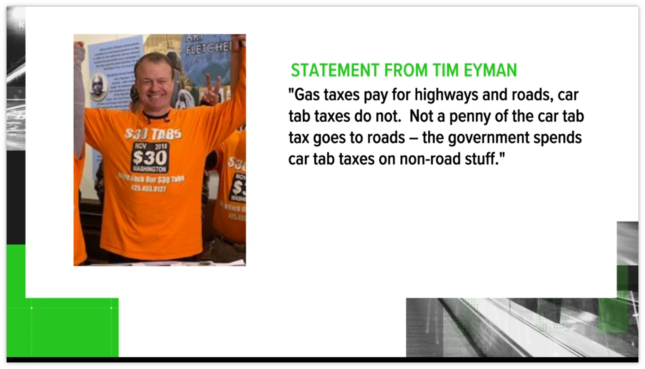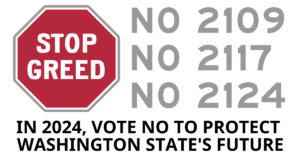In less than a month, elections officials throughout Washington will mail out ballots to military and overseas voters, kicking off the November 2019 autumn general election in Washington State. This year, voters in every part of the state will see an unprecedented number of “advisory vote” measures on their ballots… three times as many as ever before.
Conceived by disgraced initiative promoter Tim Eyman, these measures masquerade as legitimate ballot measures when they are in fact a form of push poll, similar to the widely hated malicious telephone attack campaigns classified as a “DIRTY TRICK” by Safire’s Political Dictionary.
Our team at the Northwest Progressive Institute has prepared the following Q&A to provide answers to commonly asked questions about “advisory votes”.
We hope this discussion helps you make sense of this year’s ballot.
What are “advisory votes”?
Conceptually, an advisory vote is a nonbinding plebiscite… a kind of ballot measure that asks voters to weigh in and express an opinion on an issue, but which does not change public policy.
However, at the state level in Washington, “advisory votes” are actually a form of push poll concocted by disgraced initiative promoter Tim Eyman to load up Washingtonians’ ballots with anti-tax propaganda.
Why do you call the “advisory votes” push polls, and why do you put “advisory votes” in quotation marks?
We call “advisory votes” push polls because that is what they really are.
“Advisory votes” is not an accurate descriptor, so we put it in quotes.
A push poll is generally understood to be a type of campaign tactic that attempts to influence public opinion by pretending to measure it.
For example, a candidate who wants to undermine support for a rival might pay a political operative to call voters with a script that dishes dirt on the rival candidate and then asks the voter for their opinion of the rival candidate. The poll itself is meaningless; the question being asked suggests its own answer. Consider the following script:
John Doe is running for city council this year in Anytown, Washington. John Doe was recently caught speeding by our local police department and ticketed for going too fast in a school zone. John Doe’s neighbors have also complained that his animals are aggressive and a threat to kids playing in his neighborhood. The police have been called many times to John Doe’s home to deal with complaints made against him by his neighbors. Knowing these facts, are you more likely or less likely to support John Doe’s candidacy for city council?
Notice the script ends in a question, but any data resulting from question responses is totally worthless because it is preceded by information meant to bias the listener against John Doe. That’s actually not a problem for the poll’s creator, though, because the poll itself is a mechanism for the dissemination of information that could harm the prospects of John Doe.
The results are irrelevant… by design.
Eyman’s push polls work the same way. Their language and format was conceived by Eyman, and dictated by Initiative 960, which Eyman wrote.
Each push poll follows an identical format: highly misleading information is offered about a House and Senate action that raised state revenue (beginning with the words “The Legislature imposed, without a vote of the people…”), and then voters are asked to render a verdict on the tax increase by checking one of two ovals: “Repealed” or “Maintained”.
Voters are not told that regardless of how they vote, the law will not be changed. The only hint that they’re participating in a con is in the heading, which says “Advisory Vote”.
But don’t “advisory votes” still have some value, even if they’re not binding?
No. They don’t have any value whatsoever.
In fact, they have negative value: they waste tax dollars and confuse voters. Legislators can’t draw any conclusions from an “advisory vote” result, because the questions voters are being asked are not neutrally written.
Bad inputs produce bad outputs.
As a programmer working at Microsoft, Google, Amazon, Facebook, or countless other tech companies might say: garbage in, garbage out.
You wouldn’t consider a poll that contained negative information about one candidate and positive information about another as credible; it would not be deserving of a news story. Similarly, legislators cannot use any of the data produced by the “advisory votes” to inform their future decision making. The data is garbage. It simply cannot be relied upon.
Where did “advisory votes” come from? How’d we end up with them?
The RCW establishing “advisory votes” first came into being with the narrow passage of Eyman’s I-960 in 2007.
Initiative 960 was a measure that principally attempted to reinstate an unconstitutional scheme to require a two-thirds vote to raise revenue, in violation of Article II, Section 22 of the Washington State Constitution, which says that bills shall pass by majority vote.
“Advisory votes” are not a form of ballot measure provided for by the Washington State Constitution, so we believe they are likely unconstitutional, like that two-thirds vote requirement was.
The Constitution spells out three kinds of measures: initiatives, referenda, and constitutional amendments, all of which are binding.
- Initiatives (see Article II, Section 1) are laws proposed by citizens. An initiative can either go to the people or to the Legislature for consideration. All initiatives originate from citizen petitions. Petitions must contain signatures bearing the marks of a number of voters equivalent to eight percent of the total who turned out in the last election for governor.
- Referenda (see Article II, Section 1) are votes on actions taken by the Legislature or by the Washington Citizens’ Commission on Salaries for Elected Officials. Usually, the action is a bill, but it could also be a salary schedule or an initiative passed by the Legislature. A referendum can be triggered in one of two ways: by majority vote of the Legislature, or by citizen petition. Petitions must contain signatures bearing the marks of a number of voters equivalent to four percent of the total who turned out in the last election for governor.
- Constitutional amendments (see Article XXIII) are proposed changes to the state’s plan of government. To pass, a constitutional amendment must first earn the support of two-thirds of the members of the Washington State House and Senate, then a majority vote of the people at a general election.
The first “advisory votes” appeared on ballots seven years ago, at the 2012 general election. Although Eyman’s push polls date back to December of 2007, when I-960 initially went into effect (part of it would later be struck down as unconstitutional in League of Education Voters v. State of Washington), no one remembered that they existed until several years later… not even their creator Tim Eyman.
How many “advisory votes” have appeared on Washingtonians’ ballots to date?
There have been a total of nineteen, from 2012 through 2018.
And how many will voters see this year?
Twelve. That’s three times as many as voters have seen at once before.
There are so many Eyman push polls in 2019 that important local races for county, city, port, and school board positions will be pushed to the back of the ballot.
Why are there so many this year?
Because Eyman set up his push polls to be automatically triggered any time the Legislature takes an action that raises state revenue, and the Legislature this year did more to reform our tax code than in any other recent session.
The Legislature could have nixed this year’s crop of push polls by passing Senator Patty Kuderer’s SB 5224, as The Herald’s Jerry Cornfield recently explained.
The bill cleared the Senate, but it did not get out of the House due to opposition from former Speaker Frank Chopp.
The bill remains alive and we are working to pass it in the 2020 legislative session.
As part of its efforts to create a budget that could meet the state’s needs, the Legislature adopted a slew of bills that increased state revenue. For example, the Legislature adopted a more progressive real estate excise tax (REET) which replaces the old flat REET. The new REET is graduated, so will result in some Washingtonians paying less tax, but the passage of the bill nevertheless triggers an “advisory vote” because the new REET increases state revenue overall.
The twelve bills that are fodder for this year’s push polls are:
This list is available on the Secretary of State’s website. Each link goes to the text of the bill the Legislature approved.
Despite what Tim Eyman has claimed, these revenue reforms are pretty modest.
The taxpayers most affected by the Legislature’s actions are large corporations that can easily afford to pay more to support Washington’s public services, like the Wall Street banks that lost a lucrative tax break.
What else is on the statewide ballot this year?
There are three legitimate statewide measures that are binding (meaning, their outcomes will influence public policy).
- Tim Eyman has an initiative to gut transportation funding at the state, regional, and local levels, impairing Washingtonians’ mobility (I-976).
- There is also a referendum that would reinstate Tim Eyman’s I-200 (R-88) and prohibit state agencies from undertaking affirmative action projects.
- Finally, there is a constitutional amendment, Senate Joint Resolution 8200, concerning the purposes for which the state’s emergency powers can be invoked.
Because fourteen of the fifteen measures appearing on the 2019 ballot are Eyman-related (SJR 8200 is the only one that isn’t), we’re calling it “the Eymallot”.
Are there costs associated with the presence of Eyman’s push polls on the ballot?
Yes. As The Herald of Everett recently reported:
In previous elections, each measure soaked up two pages in the voter pamphlet and the cost per page ranged between $12,000 and $15,000 depending on what else was in the pamphlet.
Final figures for this year won’t be known until September. If they’re in line with the past, these measures will require 24 pages at a cost of up to a half-million taxpayer dollars.
The costs associated with Eyman’s push polls go far beyond pages in the voter’s pamphlet statement, however. The push polls also increase the cost to Washington’s thirty-nine counties to print, send, and tabulate ballots. Quantifying these additional costs is neither simple nor easy, because the counties do not typically break down elections costs by jurisdiction and category.
However, in odd-numbered years, the counties do bill the State of Washington for state-level items, under an arrangement that dates back several decades. And in 2017, in most counties, the only state level items on the ballot were “advisory votes”, because there were no initiatives, referenda, or constitutional amendments on the ballot that year. That gives us a better idea of how much the “advisory votes” cost on their own.
As we explained to the editors and fellow readers of the Walla Walla Union-Bulletin, our research at the Northwest Progressive Institute found that Walla Walla County billed the state of Washington $11,438.52 for costs associated with the “advisory votes.” That was the bill for just one of the state’s thirty-nine counties in one year!
We have compiled a spreadsheet that documents the cost to the counties of the 2017 crop of “advisory votes”. It can be downloaded from Permanent Defense’s website.
Where can I find additional information about the “advisory votes”?



